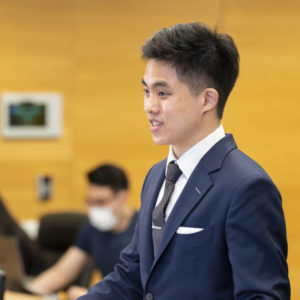
Law Society Distinguished Scholar Award
Supported by the Law Society of Singapore, the Law Society Distinguished Scholar Award aims to motivate students from the Bachelor of Laws and Juris Doctor programmes offered by the Yong Pung How School of Law (YPHSL) at the Singapore Management University who have demonstrated excellent underlying values and foundations of law and legal practice. It seeks to provide recognition for the student who has excelled and distinguished himself/herself in the Ethics and Social Responsibility, as well as Legal Theory and Philosophy courses, both of which are core courses offered by YPHSL.
The Law Gazette speaks to the two recipients of the award for 2021/22, Sarah Teo Hui Yan, and Brian Wong, who share about what the award means to them and what they hope the future holds for them.
More information about the award can be found here.

Sarah Teo

Brian Wong
1. Tell us about yourself and why you studied law.
Sarah: Prior to graduating from the SMU Yong Pung How School of Law with a Juris Doctor degree, I worked in the Central Provident Fund Board as a Project Manager disbursing national payouts such as the GST Voucher Scheme. My first degree was a Bachelor of Arts degree from the National University of Singapore where I majored in History and minored in Sociology.
The law has always been my lifelong dream. It combines my love for learning, reading, writing, and my need for a meaningful career.
Brian: Before law school, I studied political science and philosophy at NUS, and my original plan had been to do graduate studies in political philosophy. However, while delighted at my interest in their field, my professors were also candid about the realities of an academic career in the humanities, especially where prospects of tenure were concerned. Law (or at least some areas of law) seemed similar enough, not just in terms of subject matter, but also the normative and conceptual reasoning involved. And one thing which law offered me, which probably would have been harder to come by in academic philosophy, was the opportunity to do that sort of intellectual work in ways that could make a more obvious, tangible, and practical difference in the lives of those around me.
Outside my studies, I used to serve as a volunteer officer in the Boys’ Brigade between 2013 to around 2018. I also enjoy snowboarding, road trips, and generally exploring nature in temperate climates. These endeavours having been somewhat impracticable in recent years, my local hobbies mostly involve a mix of music, movies, video games, tinkering with coffee recipes, and accompanying my foodie friends on their foodie adventures.
2. What do you think it takes for one to excel academically?
Sarah: Hard work is crucial but I think it is also important for one to have a good dose of humility to admit what one does not know and a willingness to listen and learn from others regardless of who they are.
Brian: I have great respect for people who have it in themselves to just hit the books and perform well at even those academic subjects in which they have no interest whatsoever. I discovered quite early on that I was not one of those people, and I suspect most aren’t either, so affinity of some sort is probably a significant factor, whether at an intellectual or aesthetic level.
Cultivation is probably another part of it. To some extent, affinities and aptitudes are things that one either has or has not, or at most products of environment and upbringing that are effectively immutable by the time one gains the self-awareness necessary to think about shaping them. But while I was always a bit argumentative and hung up on questions of principles, rights, legitimacy, and authority, it was really my professors in university who helped me channel these preoccupations in a rational and intellectually rigorous manner, develop my ability to reason, analyse, and formulate conceptually coherent and defensible positions, and appreciate the beauty and satisfaction of doing so.
3. What does this award mean to you?
Sarah: This award came as a surprise but receiving it is also a humbling experience as it is a constant reminder to hold myself up to the honour, dignity, and ethical standards demanded of the profession.
Brian: First off, it means I really haven’t any excuse if I ever get hauled up before the Court of Three Judges. But then, memorizing provisions and principles, and citing them in a three-hour exam, is probably quite different from living them out when stressed, tired, frustrated, and juggling dozens of files at once. If anything, this award is a reminder that the true mark of distinction as a lawyer is not simply the accumulation of knowledge in the abstract, but the discipline, wisdom, and steadfastness to reflect on and hold to principle, even while assailed by the realities, challenges, and temptations of the real world.
And on a more personal level, while I enjoyed law school and almost all the subjects I encountered there, ethics and philosophy were in some sense my first love, academically. So, there is some sentimental value in knowing that after all this time (or at least what has felt like a long time), I do still retain some aptitude for those fields which remain close to my heart.
4. Who or what do you think has helped you be where you are now?
Sarah: I was very blessed to have had great teachers, friends, and family in my life who nurtured and encouraged me.
The esteemed Emeritus Professor Ten Chin Liew who was himself a student of the eminent legal philosopher, Professor H.L.A. Hart, introduced me to the world of legal philosophy in NUS. My NUS history professors taught me solid research and writing skills while my law professors in SMU gave me the necessary legal knowledge and honed my critical thinking skills.
My friends stood by me in the toughest of times, encouraged me to apply for law school and gave me the confidence to pursue my dreams.
I also owe a lot to my mother who never gave up on me despite me being dyslexic and not being able to read till I was seven years of age.
This award is dedicated to all the giants in my life who propped me up on their shoulders.
Brian: Having been neither particularly bright nor hardworking in secondary school and IB, it was only when I had the chance to explore political science and philosophy in university, and especially during my joint degree programme at UNC Chapel Hill, that I really began to flourish. The upfront costs of doing a graduate law degree also were not insubstantial, to say nothing of the income foregone from delaying my entry into the workforce. I would not have had any of these opportunities, or the resources to make of them what I did, without my parents’ forbearance, provision, and prayers.
Some credit is also due the two main institutions of my youth. The sense of self-belief and confidence that ACS tends to inculcate in its students, and the personal discipline drilled into us by the Boys’ Brigade, were both important traits which helped me to get through the difficulty and discouragement I encountered during law school. Most of all, I’m grateful for how both institutions sought to ground these values in my faith, which was itself one of my main anchors through the storms of the past three years.
5. What do you plan to do after you graduate eg any particular industry or area of law you would like to explore?
Sarah: I will be training to be a family lawyer in Drew & Napier LLC.
Brian: I must admit that I’m not in the habit of making very specific long-term plans. The most enjoyable and rewarding parts of my university life, from studying at UNC Chapel Hill to mooting in SMU and even doing law school at all, were really just interesting-sounding things I was fortunate enough to stumble into, often after Plan A had failed to materialise. There are also a great many things at which I’d someday like to try my hand – commercial disputes, community and public law, arbitration, mediation, international affairs, teaching and academia, and even possibly judicial work. This being the case, I’m very grateful to have been given the opportunity to serve as a law clerk with the Supreme Court, and my only real plan now is to learn as much as I can from some of the brightest and most experienced legal minds in Singapore, see as much as I can of the different aspects of the legal profession, refine my understanding of my own interests, passions, and aptitudes, and make an informed and considered decision as to what to do next when the time comes.
6. What do you hope to accomplish in your life?
Sarah: I hope to be remembered as the family lawyer who genuinely cared about her clients’ wellbeing and made a difference in their lives.
Brian: My hopes probably have more to do with experiences – the thrill of cross-examination as a lawyer, the satisfaction of working out the correct answer as a judge, further studies in law, philosophy, religion. Road tripping from Maine to Alaska, kayaking the Scandinavian fjords, feeding penguins out of my hand. I’d like to spend a night under the Northern Lights, a winter in the Arctic Circle, and a year watching the seasons change from a log cabin by the Great Lakes. Someday I’d hope to start a family, return to the Boys’ Brigade, and find a long-term community service project with which to get involved. The closest thing to accomplishments that come to mind would be convincing ACS to offer philosophy as an IBDP subject, and improving the general quality of public discourse, critical thinking, and political and legal literacy in Singapore. But I do think that it is experiences rather than accomplishments that make life truly rich, interesting, and meaningful, and if I hope to make anything of mine, it would simply be to experience as much of the beauty of this world as I can, in all its myriad forms.






